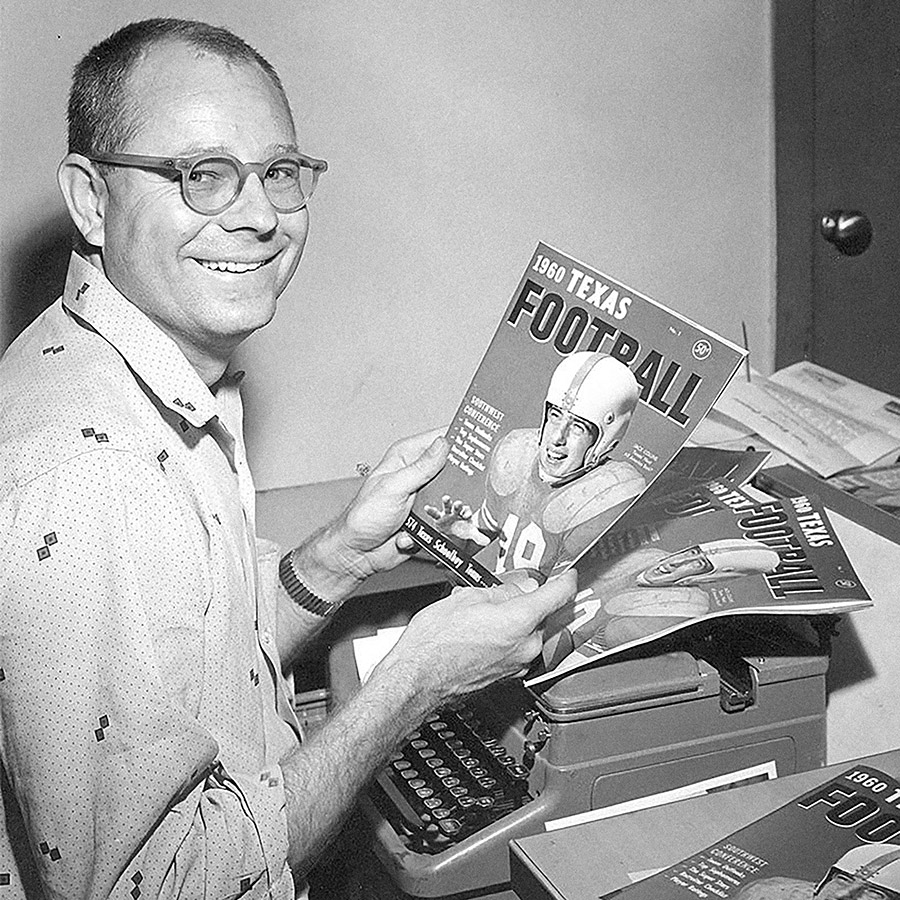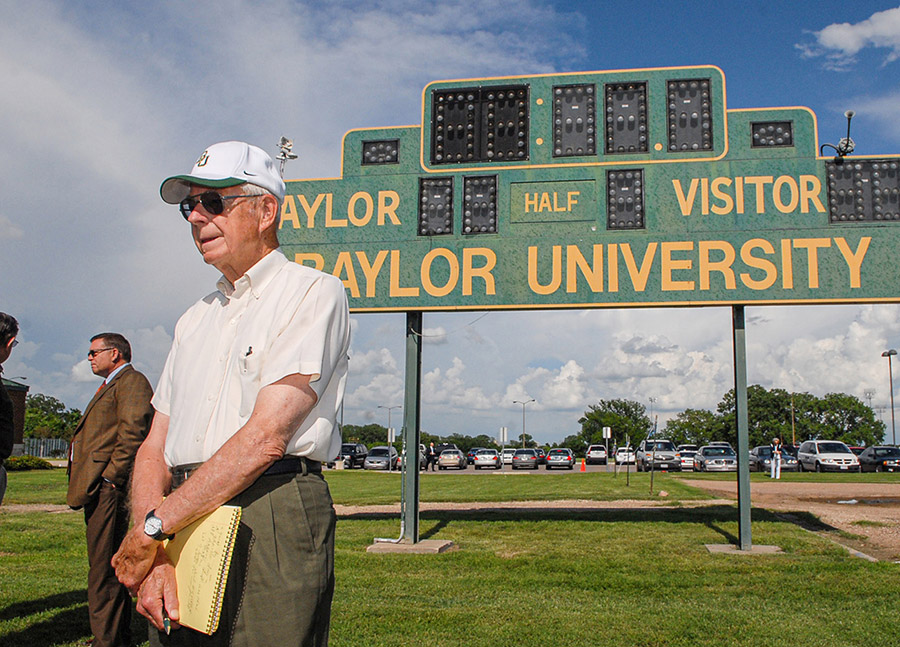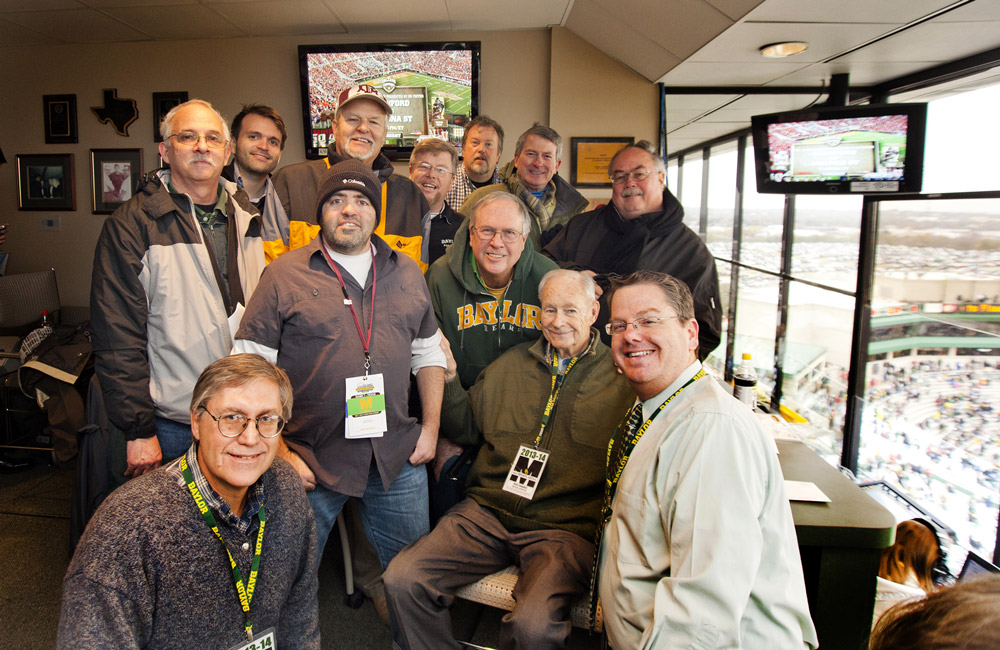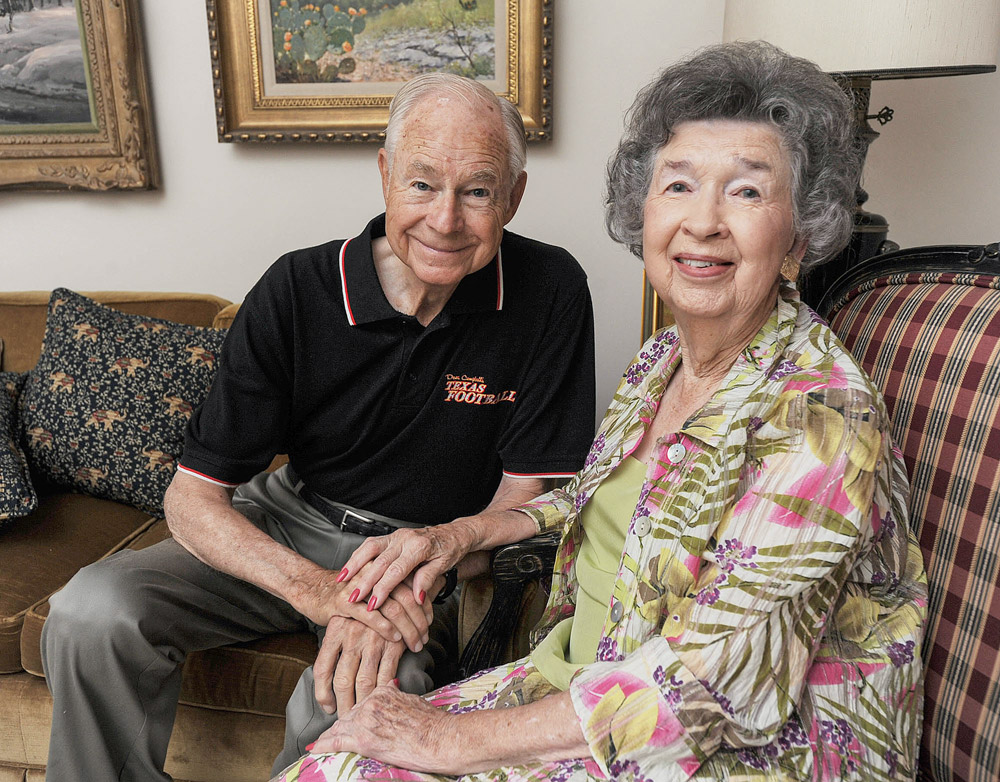Legend of the Fall
The man behind Dave Campbell's Texas Football has impacted the lives of countless people, including coaches, athletes, readers, fans — and fellow sportswriters.
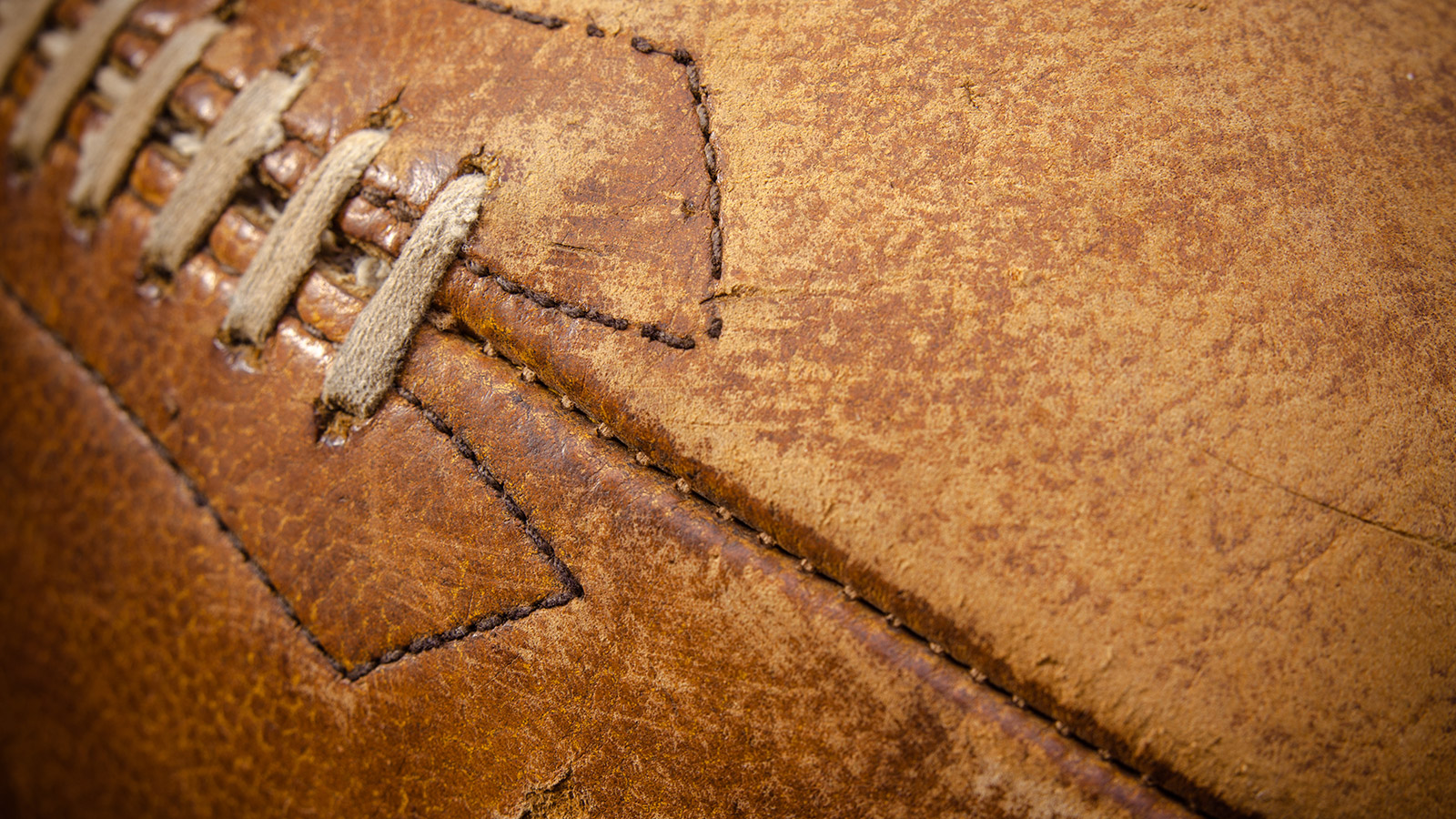
Every sportswriter has a story about “Mr. Dave.” The various titles Dave Campbell, BA ’50, has earned over the years have come alongside an ever-growing mélange of stories and experiences.
David Pickle, BA ’74, spent 27 years with NCAA Publications in two stints, sandwiched around a decade with the Houston Chronicle. His “Mr. Dave” story came in 1972 as the recently appointed sports editor of The Baylor Lariat.
Newly minted Baylor football head coach Grant Teaff and the Bears opened the season on the road against a University of Georgia squad that was 11-1 the previous season. The night before the game, legendary Georgia Sports Information Director Dan Magill hosted Pickle and other visiting media members for dinner at the Athens Country Club.
“I found myself at a table of eight, watching Dave serve as raconteur, reporter and goodwill ambassador in one glorious two-hour session,” Pickle says. “He was treated like visiting royalty, which — in a sense — he was.”
Campbell’s eminence in the sports journalism world has not waned since that September 1972 evening. It has perpetually grown. Today, he is widely considered the most recognizable and respected sports journalists in Texas history — and among those nationwide.
“If there were a Mount Rushmore of Texas sportswriters, the only question is who would the other three be,” Pickle says.
Kitchen-Table Creation
Born and raised in Waco, Campbell had plans of studying chemistry before being called to service with the U.S. Army during World War II. He fought in the Battle of the Bulge on the Western Front in the Ardennes region of Wallonia and earned the Bronze Star Medal for his valor in that campaign.
After the war, Campbell returned to Waco and enrolled at Baylor with a renewed focus on storytelling through journalism. He joined the Waco Tribune-Herald after graduation and ascended to the role of sports editor within three years. Along the way, he met Reba, BA ’47, who eventually became his wife of more than 70 years.
As Campbell built relationships and a reputation for excellence throughout the sports world, he also built the foundation for a magazine that would become one of the most eagerly anticipated sports publications each year. In 1960, he created Dave Campbell’s Texas Football in response to Baylor being omitted from a national magazine’s Southwest Conference preview.
Texas Football was devoted to coverage of football in the Lone Star State at all levels, including the state’s massive bevy of high school teams. It quickly became what most people consider to be the “bible of Texas football.”
Baylor Director of Sports Journalism Jerry Hill spent the first decade of his career working for Campbell at the Tribune-Herald. However, he knew about Campbell and his magazine long before landing that job.
“He developed a regional publication that had everyone waiting at their mailbox or standing in lines at the grocery store when it came out each summer,” Hill says.
Keith Randall, MA ’87, who also worked at the Tribune-Herald and Texas A&M University, taught Baylor’s first sports writing class for which Campbell was a regular guest speaker.
“I had students and professors crowding the room to hear him speak,” Randall says. “Every semester, without fail, someone would say, ‘My dad recalls the time when he and a buddy would sleep in their car all night at the convenience store, waiting for the truck to arrive with that year’s Texas Football magazine.’ Mr. Campbell probably heard that story a thousand times, but he always got the biggest kick out of hearing it again.”
Texas Football came into being around the kitchen table in the Campbell home. Fellow Waco sportswriters Hollis Biddle, Jim Montgomery and Al Ward assisted in the publication’s creation. Reba also played a vital role. University of Texas running back Jackie Collins graced the first cover. Six decades after the first edition, it remains one of the nation’s most heralded sports publications.
When Campbell retired from the Tribune-Herald in 1993, Kim Gorum, BA ’80, ascended to sports editor after years as Campbell’s right-hand man. Gorum, who has also written for CBSSports.com, notes that the legacy of Texas Football is about more than the sport itself.
“Sixty years after the first issue took shape on Reba’s kitchen table, Texas Football is still the gold standard of regional college and high school football magazines,” Gorum says. “Its roster of contributors over that span is a who’s who of Texas and national sportswriters — many of whom would have written for free just because it was Dave Campbell doing the asking.”
One such sportswriter is David Barron, who joined the Houston Chronicle in 1990 after stints at the Dallas bureau of the United Press International, the Tribune-Herald and the Tyler [Texas] Morning Telegraph. Barron has contributed to Texas Football since 1980, serving as high school editor from 1984 to 2000 and managing editor from 1990 to 2004.
“I tried during my years with the magazine and as an editor at the Chronicle to engage others in the product to the same degree that Dave engaged me and my contemporaries,” Barron says. “I was always cognizant during my years as the magazine’s editor that I was representing Dave’s legacy and always wanted to do my best to ensure that he could be proud of the work that we did in his name.”
Kevin Sherrington is a longtime sportswriter for The Dallas Morning News. His work has appeared in newspapers nationwide. Sherrington says Campbell’s legacy in the sports journalism field is Texas Football but that his legacy as a person is much greater.
“Sports magazines come and go, most within a year or two,” Sherrington says. “His has stood the test of time, which is remarkable in an era when magazines don’t. He wrote the ‘bible’ and handled the day-to-day chores of running a sports department, and he did it longer than most of us have been alive.
“But above all that, which was certainly enough, Dave succeeded wildly in a business full of characters but precious little character.”
No Substitute for Accuracy
Campbell retired from his newspaper career in 1993, but his career was far from finished. For the next 15 years, Baylor Bear Foundation members enjoyed Campbell’s words via the Baylor Bear Insider.
Campbell’s legacy also includes the Southwest Conference Press Tour. In the days prior to the now-standard conference “media days,” the press tour allowed media covering the former conference to have access to football and basketball coaches prior to the beginning of their respective seasons.
Baylor Assistant Director of Athletics and longtime Voice of the Bears John Morris, BA ’80, credits Campbell with starting the press tour.
“Mr. Campbell started the tour, and it was fun to see how it grew through the years,” Morris says. “He was in his element traveling from school to school and interviewing coaches and players alongside his writing colleagues.”
Campbell influenced countless journalists in his career. Amongst those is Randall, who says a convention of people Campbell has influenced and whose careers he has helped would fill the Ferrell Center. Randall worked for Campbell for nearly 20 years between the Tribune-Herald, Texas Football and the Insider.
“I look back now and realize how lucky I was,” Randall says. “Those truly were golden years for me.”
Two others whose careers Campbell heavily influenced are current Tribune-Herald sportswriters John Werner and Brice Cherry. Werner remembers admiring postgame discussions between Campbell and Teaff in the press box.
“Grant would always come to the press box after the formal press conference,” Werner says. “You don’t see coaches do that anymore. A big reason for that was Grant’s respect for Dave.”
Cherry says Campbell fits the description of a great writer, and he has enjoyed the privilege of gleaning from the legend over the years.
“He still writes today, including the occasional guest column in the Trib, and his prose is as fresh and relevant as ever,” Cherry says. “Going back and reading his copy from years ago was always a fun pastime. He could spin a phrase, and he was especially adept at avoiding clichés.”
Longtime Houston Chronicle sportswriter John McClain, BA ’75, worked with Campbell at the Tribune-Herald and developed a rich personal and professional relationship. McClain remembers rarely — if ever — needing to edit Campbell’s copy.
“Dave was so thorough and so knowledgeable. He didn’t make many mistakes,” McClain says. “I never saw him misspell a word; he was a spelling freak.”
Gorum, who edited Campbell’s writing for two decades, says he can count on one hand the mistakes he caught.
“And I hedge only because I’ve learned to not trust my memory. I don’t recall any mistakes at all,” Gorum says.
Campbell’s deft writing was the product of attention to detail and an impeccable memory. His precision was impressed upon his protégés such as Tony Pederson, professor and The Belo Foundation Endowed Distinguished Chair in Journalism at Southern Methodist University. Pederson, BA ’73, the former managing editor and executive editor of the Houston Chronicle, worked with Campbell at the Tribune-Herald.
“I learned there was no substitute for accuracy,” Pederson says. “If a touchdown play began at the 18-yard line, you had better not write that it began at the 19-yard line or anywhere else.
“He has an extraordinary legacy in the people who worked for him and went on to be successful in journalism. It’s a remarkable number. Most, if not all, of us who had the chance to work for him consider that as a turning point in our careers.”
To be thought of in high esteem by Campbell is the highest of honors for any sportswriter. Sherrington was humbled while covering a game in Waco when Campbell pulled him to the side.
“He had nominated me for Texas Sportswriter of the Year, and he said he hoped I’d win it,” Sherrington says. “I was flabbergasted — hardly knew what to say. For the record, I didn’t win it that year, not that it mattered. Dave Campbell thought I was good enough. He’s never failed to offer support of me and my work. I’m as grateful for that now as I was nearly 40 years ago.”
Better than Anybody
During an interview for an oral history, Pederson asked Campbell about the December 1969 football game between top-ranked Texas and second-ranked Arkansas. The Longhorns edged the Razorbacks, 15-14, in what was labeled the Game of the Century.
“I figured Dave would give me an overall comment or some specific memory,” Pederson says. “Instead, he gave me — from memory — every play of the winning drive for Texas, including several specific downs and distances. It was unbelievable.”
Campbell’s ability to reference minute details from a game nearly a half-century ago is enjoyable for any who have the opportunity to pick his brain. What makes interacting with the legend special, however, is his humble nature and general interest in other people.
“Sitting next to Dave Campbell in a press room was always a joy,” Gorum says. “He is so curious and his conversation skills so elegant that you think you’re getting information out of him when actually it’s the other way around.”
The press box at Floyd Casey Stadium was named for Campbell and entrepreneur, philanthropist and fellow author Bernard Rapaport. A bronze plaque with relief busts of the pair was displayed on the wall. Former Baylor Assistant Athletics Director for Communications Julie Bennett remembers the pregame tradition.
“All media relations staff and student workers would go touch the forehead of Mr. Campbell’s bust on the plaque for good luck,” Bennett says. “For the last game in Floyd Casey Stadium, I also went and gave Mr. Dave’s actual forehead a touch for good luck. He got a real kick out of that.”
It seemed to work: Baylor defeated Texas, 30-10, to claim the program’s first outright conference title in 29 years.
University of Missouri Deputy Athletics Director for Communications Nick Joos was a Baylor associate athletics director at the time of that game. Joos, an Iowa native, developed an appreciation for the Texas legend during his time in Waco.
“Every week, Mr. Campbell would stop by my office,” Joos says. “We’d talk about the games, the department and other happenings within the athletics world, Waco or the state. I look back fondly on all of our conversations and will treasure them for the rest of my life.
“If up-and-coming sportswriters are looking for someone to model their careers after, Dave Campbell would be a good starting point. It was a privilege to work with Mr. Dave during my time at Baylor, and I’m glad to call him a friend.”
Morris says Waco and the Baylor Family has been blessed to have men the caliber of Campbell and Morris’ mentor Frank Fallon (deceased).
“Those two media legends would match up favorably with any market in Texas,” Morris says. “Both personally and professionally, we could not have been more fortunate.”
McLain says he thinks about Campbell every day — while writing and when thinking about fairness.
“He’s the epitome of fairness,” McClain says. “When I’m thinking about credibility as a journalist, I think about Dave. Integrity, honesty, how you deal with people. Dave has done it better than anybody for decades.”
Hill, who succeeded Campbell as editor of the Insider, says he would not be the writer or the man he is today without Campbell’s influence and impact. Hill says Campbell’s grace and compassion were never more on display than in Reba’s final years. She died in January.
“His love for Reba and their daughters Becky and Julie has been an inspiration and model for me to follow and try to emulate,” Hill says. “He never complained or relented in staying by Reba’s side as her health got worse. More than his writing style, I want to be the kind of man, husband and father Dave has been.”
